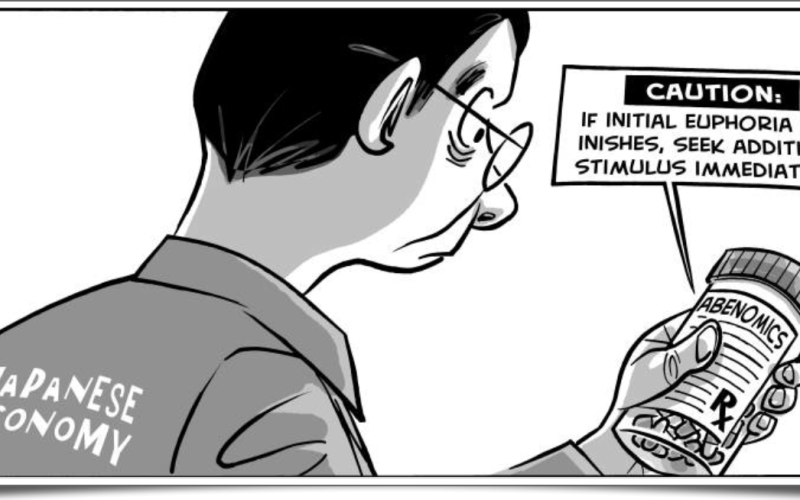by Guy Bruten, AllianceBernstein
Prime Minister Shinzo Abe’s “Abenomics” program, designed to revive Japan’s economy, was a big success in its first five months, easily surpassing low expectations. But it’s drifted off course since it began, and the going is sure to get tougher from here. Still, it’s too early to write off this policy experiment.
From the get-go, the program’s aggressive monetary stimulus helped drive the yen down sharply and push the equity market skyward. The upbeat message from the Nikkei filtered through to business and consumer confidence—with both rising to levels not seen since 2005.
And there were signs that rising confidence was flowing through to spending: the 4% seasonally adjusted annualized expansion in gross domestic product in the first quarter, for example, was underpinned by solid private consumption.
But over the past few weeks, Abenomics has had some trouble staying on track. Both the first and third arrows in what Abe calls his “policy quiver”—aggressive monetary easing and the growth strategy—have run into problems.
The first arrow sailed when the Bank of Japan (BOJ) initiated a bond-buying plan in April to lower government yields. The hope was that a flatter yield curve would encourage banks and institutions to seek riskier assets such as Japanese equities and real estate.
Instead, the market for Japanese government bonds (JGBs) has fluctuated wildly (relative to its usual mill-pond–like calm), with yields actually rising instead of falling. The BOJ at first dismissed the volatility as a “bond-market issue,” but the problem is deeper and has helped bring about a sharp equity correction and reversal in the yen. Ultimately, the BOJ’s inability to control the volatility undermines the credibility of the bond-buying program.
Stall or Fall?
The response to this setback, and to any further rise in volatility, will be telling—and will determine whether the program’s stall becomes a fall. We believe that it’s possible for the BOJ to take larger steps—through talk and action—to squelch JGB volatility.
At a recent press conference, BOJ Governor Haruhiko Kuroda claimed that the BOJ had already been successful at doing this—by listening to market participants and implementing a more flexible bond-purchase program. In his opinion, nothing more was necessary at this stage.
But in fact, Kuroda left the door open for further measures: extending the term and ramping up purchases of Japanese REITs and ETFs were both discussed at the press conference. The BOJ’s options also include expanding the purchase program again or accelerating its implementation, increasing the purchase of risk assets or foreign bonds, and cutting rates on excess reserves.
Short on Details
Investors have been disappointed too at Abe’s failure to provide detail on his third arrow—strategies to boost Japan’s longer-term growth prospects. But this disappointment is misplaced, in our view, and puts the cart before the horse. Details on the most controversial elements of the program were only ever likely after July’s upper-house elections. If Abe can win a majority, as is widely expected, that’s when the real test will come. He’ll need to lay out his plans for promoting growth and implementing the more politically challenging parts.
So what does this mean for the success of Abenomics? As with any major new policy, there will be setbacks and hiccups. At this juncture, it’s much too early to write off the Abenomics agenda. But the setbacks underscore the fact that expectations are high and that investors and consumers are looking for delivery and execution, not just promises. More hurdles lie ahead—the hardest parts of this regime shift are still to come.
The views expressed herein do not constitute research, investment advice or trade recommendations and do not necessarily represent the views of all AllianceBernstein portfolio-management teams. Past performance of the asset classes discussed in this article does not guarantee future results.
Guy Bruten is a Senior Economist at AllianceBernstein Australia.
Copyright © AllianceBernstein














